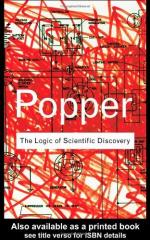|
This section contains 588 words (approx. 2 pages at 400 words per page) |

|
Inductive Method and Logicappears in non-fiction
Inductive methods rely on experiences as the source of scientific theories, inferring universal statements from singular statements. Popper does not believe induction is a scientific method. Much of this book involves refuting inductivist methods even when used by epistemologists with whom Popper may otherwise agree.
Empiricismappears in non-fiction
Empiricism relates to our experiences. Empirical sciences are based on sense perceptions, or our experiences. While Popper finds empiricism useful in some aspects of scientific inquiry, he claims that inductivists inappropriately use these experiences as sources from which to derive theories.
Deductive Method and Logicappears in non-fiction
Deductive methods are those used to derive singular statements from one or more universal statements together with initial conditions that apply to the statement in question.
Metaphysicalappears in non-fiction
Metaphysical is non-empirical. Positivists extend this definition to include meaningless and nonsensical. Popper considers the fallacies of inductive...
|
This section contains 588 words (approx. 2 pages at 400 words per page) |

|




